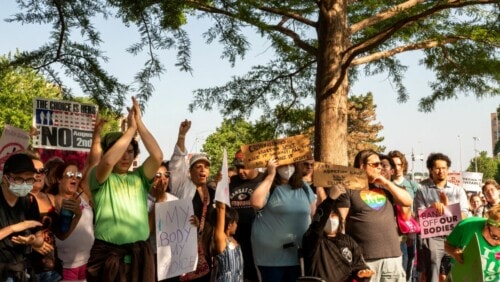Will Missouri’s Abortion Ban Alter Election Outcomes This Year? Polls show most Missourians do not agree with the decision to overturn Roe v. Wade, but experts don’t think it will have much of an influence on November’s results.
Published September 27th, 2022 at 6:00 AM
Above image credit: State Rep. Emily Weber, who is running unopposed for reelection in 2022, speaks at a rally after Missouri's HB 126 went into effect. (Zach Bauman | The Beacon)Missouri voters won’t find a yes or no question about abortion access on their general election ballots. But Democrats hope the implications of the U.S. Supreme Court decision overturning Roe v. Wade and the state’s abortion ban will help them cut into Republican supermajorities in the state legislature.
Polls show that a majority of Missourians support a person’s right to an abortion in some cases. But political experts don’t think those findings mean that Republican candidates who oppose abortion in almost all instances are endangered in their races for U.S. House and Senate.
However, Democrats are targeting 15 legislative districts as potential opportunities to increase their numbers in the state House, where they are currently outnumbered 107 to 48. Many of the competitive seats are in suburban areas, including Lee’s Summit and Platte County, as well as some seats near Columbia and Springfield.
Missourians have particular stances when it comes to how much access to an abortion they think a person should have, according to an August poll conducted by St. Louis University and YouGov. Overall, 50% of respondents said they disagree or strongly disagree with the Supreme Court’s ruling to overturn Roe v. Wade.
There are significant divides between suburban and rural opinions, according to the poll, which was conducted Aug. 8-16 among 900 likely Missouri voters. The margin of error is 3.75%.
According to polling, 62% of rural Missourians said they strongly agree or agree with the decision to overturn Roe v. Wade. In contrast, 43% of suburban voters felt the same way.
Across the state, 58% of Missourians agreed that a woman should be able to legally obtain an abortion in Missouri during the first eight weeks of pregnancy. That number shrank to 40% when respondents were asked if they should be able to obtain an abortion in the first 15 weeks of pregnancy.
Missouri’s current law bans abortions in all instances except to save the life of the mother in a medical emergency.
Opinions on Abortion Access are Complex and Nuanced
Steven Rogers, a professor of political science at St. Louis University who directed the poll, said the public has a complex view of access to abortion that can be hard to translate during a campaign season.
Despite general opposition to the Supreme Court’s decision, Rogers said voters typically use a broad perception of national politics to decide how to vote, especially in midterm years like this one.
In the poll, 64% of rural voters and 46% of suburban voters strongly disapprove of Joe Biden’s performance as president. Rogers said those numbers could play a larger role in election results than any dissatisfaction at the state level.
“The best predictor of how someone is going to vote in their state legislative election, after their party identification, is what they think of the president,” Rogers said. “It’s almost always the case. People like to say all politics is local, but national politics often dominates state legislative elections.”
Rogers added: “If you connected to this national narrative, suburban voters aren’t happy with the abortion decision. But then, still pretty overwhelmingly, they are not happy with Biden as well.”
Despite disagreement with the Supreme Court ruling, candidates who oppose abortion celebrated wins across the state after the August primary election.
For a handful of years in the Senate, a group of conservative Republican members formed a small faction which they dubbed the “Conservative Caucus.” The group pushed against mainstream Republican leadership and threw a wrench in much of the spring’s legislative business.
But after primary wins in August the group disbanded. Members said they thought the next class of freshmen Republicans would be sufficiently conservative to make the caucus unnecessary.
Susan Klein, executive director of Missouri Right to Life, pointed to the announcement as an affirmation that the state is moving in what she said is the right direction.
“We saw this as a resounding voice from across Missouri, that we want the Republicans to come back together and basically be a ‘conservative caucus’ of 24 Republicans in the Missouri Senate,” Klein told talk radio host Pete Mundo. “We want to defund Planned Parenthood. We have to address the issue of abortion drugs coming into Missouri.”
How Does Abortion Access Come Up on the Campaign Trail?
Democratic Rep. Ashley Aune is running for reelection in the 14th District, which includes parts of Platte and Clay counties. Aune won with 53.4% of the vote in 2020 and she said she hears about abortion access and reproductive care frequently while campaigning this year, with voters nearly always the ones to raise the issue.
“What I’m hearing from all of my colleagues in tough districts and tight races, especially in suburban areas across the state, is people are bringing this up to us. We don’t even have to say it,” Aune told The Beacon. “When I ask them what issues are important to them, I hear the economy, I hear reproductive care, and I hear extremism in Missouri politics.
She added: “The abortion issue really is tied into that extremism. People are people are tying the abortion ban that was signed into law with extremism. They believe it is a step too far.”
After the Supreme Court’s Dobbs v. Jackson decision, which overturned Roe, Missouri became the first state to issue an all-out ban on abortions. Attorney General Eric Schmitt, who is running for Senate to replace retiring GOP Sen. Roy Blunt, and Gov. Mike Parson signed documents triggering the state’s ban to go into effect.
A bill passed in 2019, called the Right to Life of the Unborn Child Act, bans all abortions with the exception of when the mother’s life is in danger. In the recent poll on the topic, respondents overwhelmingly believe abortion should be available in the cases of rape, incest or life-threatening medical emergencies, but don’t believe a person should be able to get an abortion for any reason at all.
Aune pointed to the opposition to a total abortion ban, and said the lawmakers who wrote the law were likely not anticipating a ruling overturning Roe, which enshrined a right to an abortion in the U.S. Constitution.
“I think even the lawmakers who crafted the language … didn’t actually expect Roe to be overturned. They wanted to get a win,” Aune said. “They wanted to show that they were super extreme on abortion while actually not really effecting any change. But, surprise, they passed a law that went into effect and is hurting a lot of women.”
She said she thinks these issues will have Missourians fired up and potentially bring new voters to the polls in November.
“I do think a lot of people are going to turn out in November, as single-issue voters voting to protect a constitutional right to abortion, across the country, wherever they can,” Aune said. “I think that we’re going to see a lot of first-time voters and people who were not historically engaged.”
Meg Cunningham is the Missouri Statehouse reporter for The Beacon, where this story first appeared. This story is part of ongoing midterm election coverage by members of the KC Media Collective.









